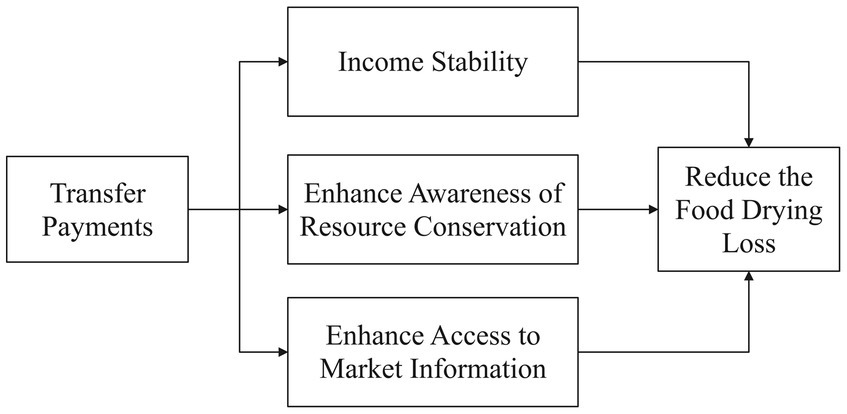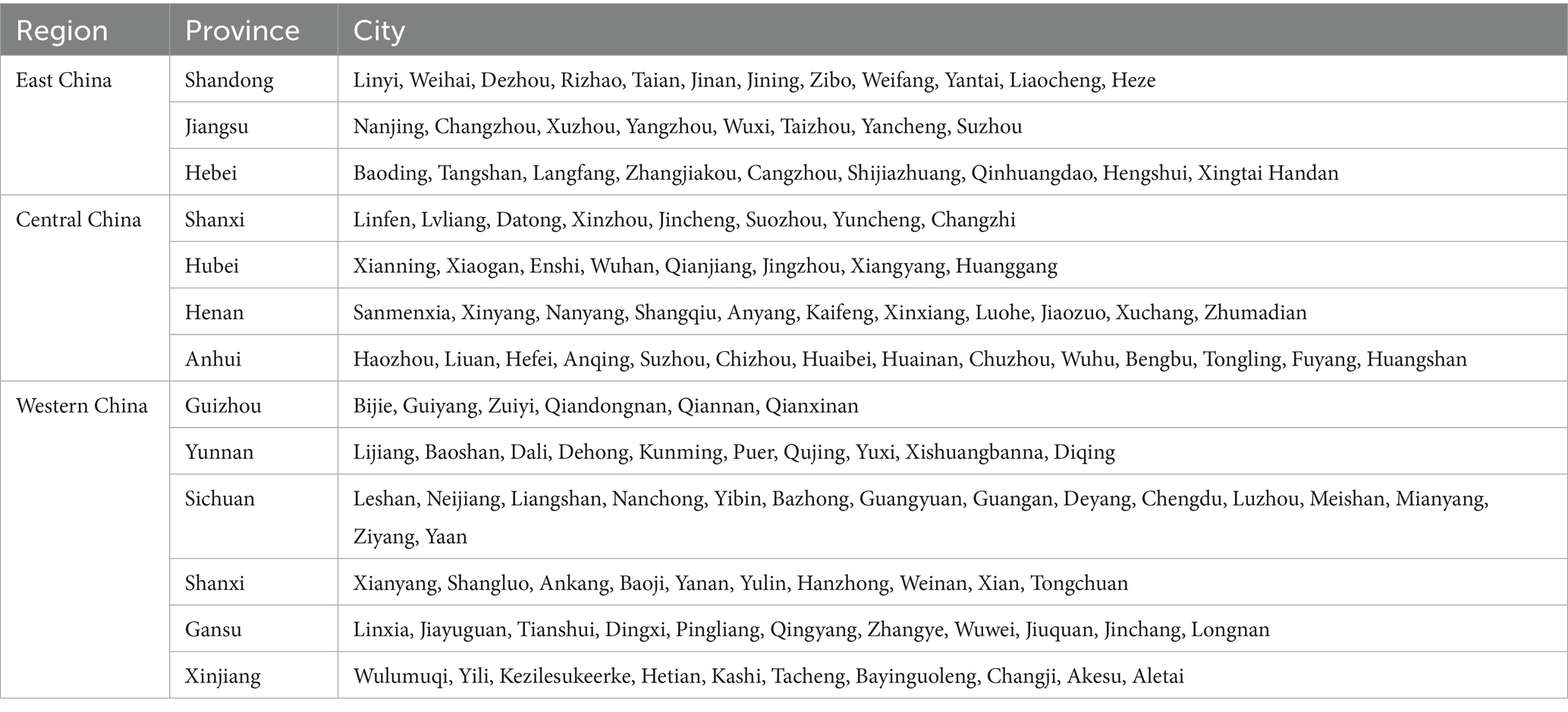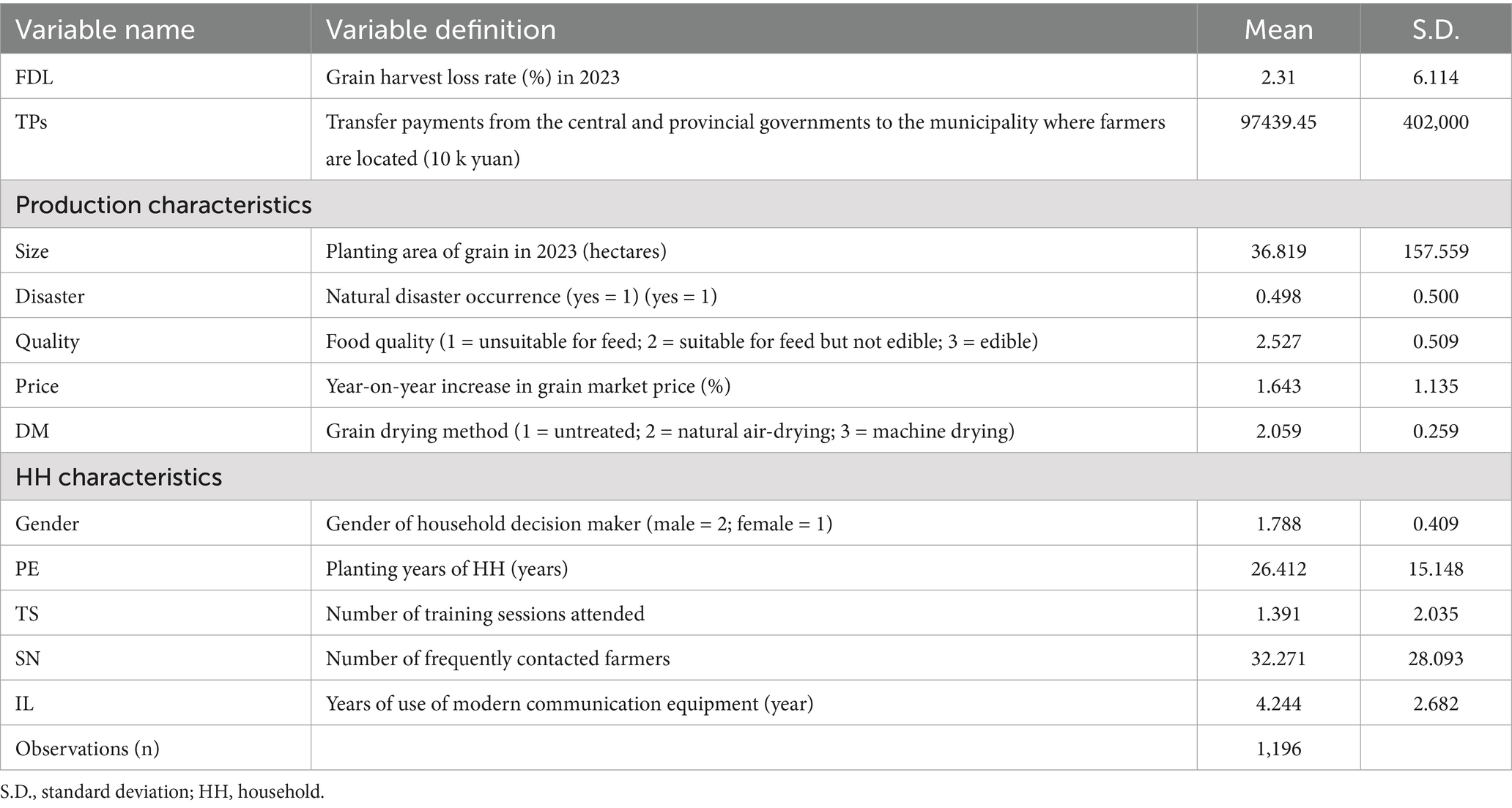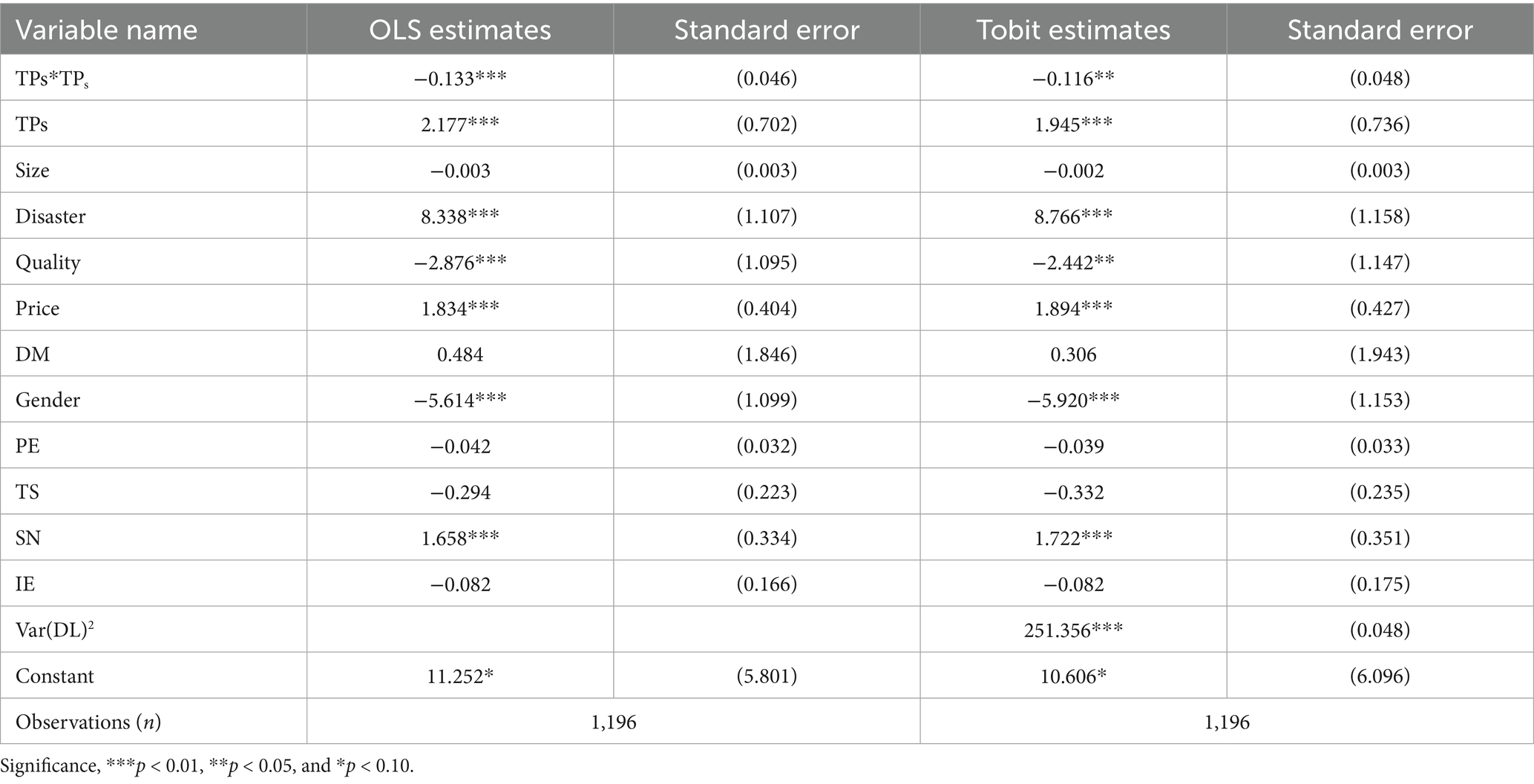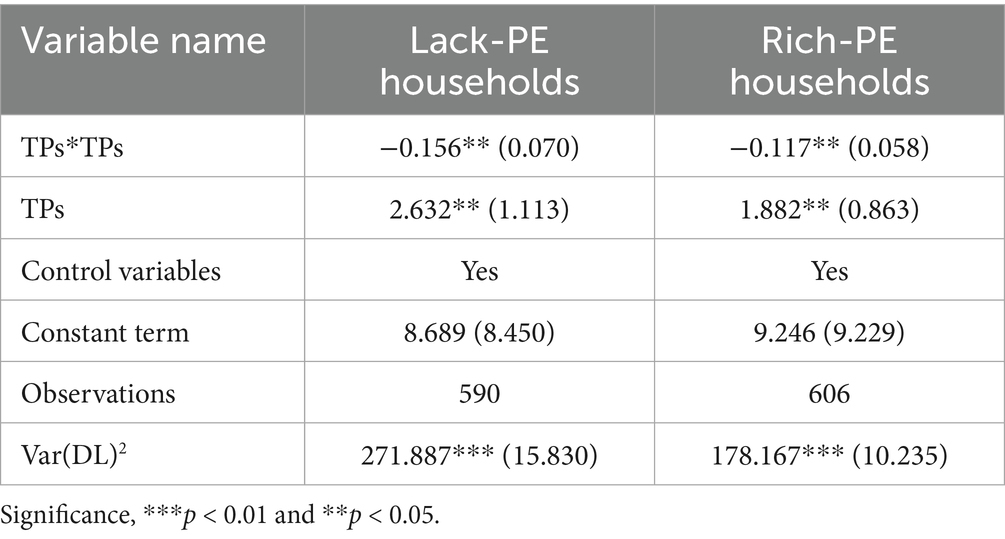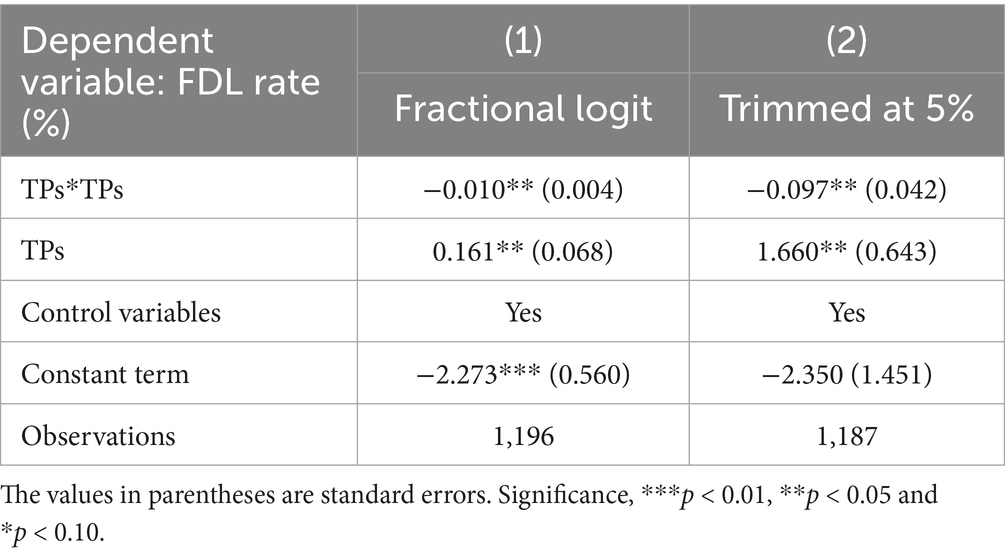- 1School of Public Finance and Taxation, Hebei University of Economics and Business, Shijiazhuang, China
- 2Department of Economics and Management, China Agricultural University, Beijing, China
- 3National Development and Reform Commission, Beijing, China
Introduction: In 2024, China issued the “Action Plan for Grain Conservation and Anti-Food Waste,” signifying a new phase in the efforts towards food security and waste reduction. Reducing food loss at the farm level is a crucial component of this action plan. This paper studies the impact of transfer payments on food loss in rural households.
Methods: Using data from a field survey on 1,196 rural households across six provinces of China, this study build Tobit models to conduct the empirical test.
Results: The results show that: (1) The relationship between transfer payments and household food loss exhibits an inverted U-shape, whereby the loss rate first increases and then declines with rising levels of transfer payments. This non-linear effect remains robust across various model specifications and sample robustness checks. (2) Heterogeneity analysis indicates that the impact of transfer payments is significantly stronger among small-scale farmers, households located in western regions, and those with limited farming experience. (3) In addition, natural disasters, food quality, and the gender of the household decision-maker are found to exert statistically significant effects on food loss.
Discussion: This study presents a better understanding of the actual impacts of transfer payments on food loss in rural China, and provides valuable insights for other countries or regions that also engage in the improvement of income to reduce food loss and waste.
1 Introduction
In recent years, excessive human production activities have led to ecological environment degradation, frequent extreme weather and natural disasters, bringing unprecedented challenges to food production and exacerbating the issue of food security. China must feed 20% of the world’s population with only 7% of the world’s arable land. Under the constraints of the “1.8 billion mu” arable land red line and declining arable land quality, ensuring food security has become a top priority. Thanks to advancements in agricultural technology and optimized allocation of agricultural input factors, China’s total grain output has remained stable at more than 1.3 trillion catties for nine consecutive years, achieving a historic 20 consecutive bumper harvests in 2023 (Dong et al., 2025), further enhancing its food supply security. However, past agricultural production has excessively relied on natural resources such as land and water, as well as inputs like fertilizers and pesticides, leading to non-point source pollution, soil degradation, and other issues. Agricultural production has exceeded the environmental carrying capacity. With natural resource constraints becoming increasingly tight, food loss (FL) on the supply chain side is staggering.
According to the UNEP, the world wasted an estimated 1.05 billion tons of food in the retail, food service and household sectors combined in 2022 (United Nations Environment Program, 2024). In China, the overall food loss and waste rate is 22.7% in 2022. The report of the 20th National Congress of the Communist Party of China emphasized the need to comprehensively consolidate the foundation of food security. Thus, reducing FL is not only crucial to China’s food security, but also of vital importance for the efficient utilization of agricultural production resources (Shen et al., 2023). Researching how to reduce FL has become an important topic for policymakers and academia at this stage. Therefore, this study explores the impact of government transfer payments (TPs) on farmers’ FL from the perspective of farmers’ income, so as to enrich the existing research.
2 Literature review
Existing literature on FL has primarily centered on several key areas: the conceptual definition of FL, methodologies for its measurement and assessment, its underlying causes, mitigation strategies, and evaluations of intervention outcomes. FL-broadly encompassing both loss and waste—occurs at multiple stages of the food supply chain, including production, transportation, storage, and consumption. Studies examining the extent of FL generally fall into two categories. The first comprises macro-level assessments conducted by international organizations and national governments. Each year, 14 percent of the world’s food production, valued at 400 billion U.S. dollars, is lost in the value chain between harvest and retail, while another 17 percent (approximately 931 million tons of food) is wasted at the retail and consumer levels. Food waste primarily occurs at the household level (FAO, 2019).
The second category involves micro-level studies using sample surveys or controlled experiments to estimate FL by crop type, supply chain segment, and geographic location (Gao et al., 2015). Findings indicate that although FL is widespread globally, the specific stages where losses occur differ significantly between developing and developed countries. In developing economies, FL is concentrated at the upstream stages-namely harvesting, drying, and on-farm storage-whereas in developed economies, losses predominantly occur downstream, especially during retail and consumption (Jiao et al., 2021). Methodologically, these studies often adopt a material flow perspective by decomposing the supply chain into distinct stages, measuring losses at each step, and calculating an aggregated loss rate through weighted summation. Quantitative assessments from China offer illustrative examples. Wang et al. (2021) found that in 2018, household-level food waste in selected regions of China occupied an ecological footprint of 62.54 million hectares, averaging 448 m2 per capita. Based on China’s average per capita ecological footprint of 1.5 hectares, this implies that the ecological space of approximately 41.69 million individuals was effectively appropriated.
The drivers of FL can be broadly categorized into subjective and objective factors. Subjective drivers include individual and household-level attributes such as work attitudes (Qu et al., 2022), awareness of food conservation (Cao et al., 2018), and household storage practices (Gitau et al., 2024). Objective factors include environmental conditions, farm size and the availability of fiscal support (Li et al., 2019). Some scholars propose a more actor-centered typology based on roles within the food system. For example, among smallholders, key determinants include field management practices (Qu et al., 2021) and production scale (Luo et al., 2022). In the case of agri-businesses, relevant factors include storage technologies (Luo and Wu, 2021), crop variety (Wu et al., 2022) transportation logistics and processing techniques (Liao et al., 2022). For consumers, food loss is influenced by economic status (Wang et al., 2021) and motivations for dining behavior (Cheng et al., 2017). Together, these findings underscore the complexity and heterogeneity of food loss across different contexts and actors. Addressing this issue requires targeted, multi-level strategies tailored to the specific characteristics of each stage and stakeholder group within the agri-food system.
The existing literature has provided a solid theoretical foundation and practical reference for the development of this study; however, there are still several areas that require improvement. Firstly, there is a scarcity of literature analyzing the impact of income on FL from the perspective of TPs; however, as a form of unearned income, TPs have a significant impact on farmers’ FL reduction behavior. Secondly, existing studies have mostly focused on food losses in stages such as harvesting and storage, while paying relatively little attention to losses in the drying stage. However, reducing food losses in the drying stage is of great significance for reducing food losses across the entire supply chain. Thirdly, due to data limitations, there is a lack of research examining this impact at the national level and the regional differences in the impact across the eastern, central, and western parts of the country. Therefore, this study uses survey data from 1,196 rural households in six provinces in China, first constructing a theoretical mechanism of how TPs affect food loss in drying stage (FDL) in rural households, and then empirically examining the impact of TPs on FDL in rural households, exploring the heterogeneity of this effect across household and regional characteristics.
Compared with previous literature, the possible innovations of this study are: first, this study explores the possible underlying mechanisms, providing a theoretical basis for the government to implement targeted FDL intervention measures. Second, previous studies on FDL have mostly focused on estimating its level (Wang et al., 2021; Luo et al., 2022; Csordás, 2024) and its consequences (Cao and Hao, 2018), but there is insufficient research on the causes of FDL from a micro-household perspective. By focusing on TPs, this study analyzes the possible causes of FDL in rural households, enriching the existing literature on FDL.
The remainder of this paper proceeds as follows. Section 3 presents the theoretical analysis of the relationship between TPs and FDL. Section 4 describes the study area, data and estimation framework. Section 5 presents the empirical results, and Section 6 discusses the findings further research and policy implications.
3 Conceptual framework and hypotheses
Based on demand theory and household production theory, a theoretical model is constructed to analyze the impact of TPs on FDL in rural households. In the theoretical model, it is assumed that rural households derive utility from consumption. The specific form of the utility function is shown in Equation 1:
In the Equation1, represents the utility function of consumption for rural households, following the principle of a strictly concave function; represents the amount of agricultural inputs by the rural household. When the amount of agricultural inputs increases, the utility of rural households increases, i.e., . However, as agricultural inputs increases, the marginal utility of agricultural inputs for rural households diminishes, i.e., . Therefore, according to the grain production function proposed by Ellison and Lusk (2018), the amount of agricultural inputs is decomposed into a function of the quantity of inputs and the time grain growth. Thus, Equation 1 evolves into Equation 2:
In the Equation 2, is the actual quantity of agricultural inputs purchased by the rural household, represents the period of grain development, and is the production function of grain for household , which satisfies . The form of the FDL function can be expressed as:
In the Equation 3, represents the amount of FDL and other variables have the same meanings as in the Equation 2. The FDL function consists of the quantity of agricultural inputs purchased, the period of grain development, and the agricultural production technology. Assuming the production technology remains unchanged, an increase in the quantity of agricultural inputs purchased will reduce the amount of FDL, while an increase in the grain growth period will lead to an increase in FDL. The budget constraint for rural household FDL is assumed to be:
In the Equation 4, is the price of agricultural inputs, and represents the amount of TP received by the rural household. represents the total income from other sources for the rural household. Based on Equations 3, 4, the functional form of the impact of TP on FDL in rural households can be derived as:
From Equation 5, it can be seen that TPs have a significant inhibitory effect on FDL. This study suggests the possible reasons are as follows:
First, TPs improve income stability for farmers and ease liquidity constraints. With enhanced financial capacity, rural households are more likely to invest in food storage facilities, harvesting machinery, and post-harvest handling technologies, which effectively reduce losses during both field and storage stages. Second, TPs are often implemented alongside agricultural subsidies, technical extension programs, and other supportive policies. These complementary measures not only increase household income but also raise farmers’ awareness of resource conservation and sustainable agricultural practices, thereby encouraging more efficient production and consumption behaviors. Third, public transfers improve farmers’ access to timely market information and logistics services, enhancing the efficiency of agricultural product circulation and reducing losses caused by unsold inventory or poor transportation conditions. Lastly, as household incomes rise, consumption becomes more rational, mitigating waste stemming from overproduction or improper grain storage. In sum, beyond their traditional role as a social safety net, TPs serve as a crucial policy instrument for enhancing food system efficiency and promoting sustainability in rural regions. The impact mechanism of TPs on FDL is shown in Figure 1.
Moreover, it is noteworthy that the relationship between TPs and FDL is not linear. Specifically, the mitigating effect of TPs on FDL to emerge only when the amount of TPs reaches a certain threshold. In China’s agricultural subsidy system, most of the TPs received by farmers are not earmarked for specific purposes. As a result, the additional income brought by increased TPs may not be invested in FDL reduction efforts. In some cases, the relaxation of budget constraints may even lead farmers to reduce meticulous farming practices, thereby increasing losses. However, in the later stages, as TPs continue to rise, farmers tend to increase their investment in loss reduction, resulting in decreased FDL. Based on the above analysis, the following hypothesis is proposed:
TPs have a significant impact on FDL, and this relationship is nonlinear.
4 Data and measures
4.1 Sample and data collection
This study utilizes survey data collected through a collaborative project between the research team and the National Development and Reform Commission (NDRC). The survey was conducted from June to July 2023 and covered 2,259 rural households across 322 counties (or districts) in 155 cities within six provinces in China. A multi-stage random sampling method was employed to select the sample. The sampling process was as follows: first, six provinces were selected based on geographic location, economic development level, and consumption structure; second, within each province, cities were randomly selected based on population size, followed by the selection of 2–3 counties in each sampled city; third, 2–3 villages were randomly selected within each county, and within these villages, households were randomly chosen for face-to-face interviews.
The survey collected information on both household and village characteristics, as well as data on the planting and post-harvest losses of major summer crops such as wheat, soybeans, and potatoes. To enhance the accuracy of the research results, this study focused on a specific type of summer grain. Considering that wheat is the primary crop for most surveyed households (with 74% of farmers planting wheat), this study specifically examines wheat losses. The final sample used in the analysis comprises 1,196 households. The detailed distribution of the survey sample is presented in Table 1.
4.2 Variables
1. Dependent variable: Food loss in drying stage (FDL) this refers to the loss of major summer grains (specifically wheat) during the drying stage. In this study, the FDL rate is used as a representative measure, defined as the proportion of total losses during the four key harvest processes-reaping, threshing, field transportation, and grain cleaning—relative to the total output (i.e., the sum of actual yield and harvest losses). The equation for calculating FDL is as follows:
In Equation 6, represents the FDL rate of the household , Represents the food loss during the drying stage. denotes the total grain output.
1. Explanatory variable: TPs according to the definition provided by the National Bureau of Statistics, TPs refer to funds allocated by higher-level governments to lower-level governments without repayment obligations. This study examines the impact of municipal-level TPs on household food loss among rural residents. The logarithm of TPs from the central and provincial governments to the municipalities where the households are located is used as a proxy variable.
2. Control variable: Based on existing literature (Luo et al., 2022), this study introduces relevant control variables from two aspects: production characteristics, household characteristics. Production characteristics include plant area of grain (size), natural disaster occurrence (disaster), food quality (quality), year-on-year increase in grain market price (price), grain drying method (DM). Household characteristics include the gender of the decision-maker (gender), the decision-maker’s planting experience (PE), number of training sessions attended (TS), social network (SN) and information literacy (IL) (see Table 2).
4.3 Empirical methods
Based on the theoretical analysis and existing literature (wang et al., 2015; Wenlock et al., 1980), this study establishes the following econometric model:
In Equation7, represents the FDL rate of the household , ranging from [0,1]; represents the amount of TPs received; To verify the non-linear relationship between TPs and FL, an interaction term of TPs ( ) is added to the model. represents the production characteristics of the household ; represents the characteristics of the rural household ; is the constant term; are the coefficients to be estimated; and is the error term.
Considering that the FDL rate of rural households is a percentage ranging from 0 to 1 (including 0 and 1), there may be a large number of zero-valued variables, making it difficult to meet the linear assumptions of the ordinary least squares method. To ensure the accuracy of the research results, this study follows the existing literature (Li and Liu, 2021; Yang et al., 2021; Zhang et al., 2018) and uses the Tobit model to extend the applicability of the model. The Tobit model is suitable for scenarios where the dependent variable is continuously distributed but includes some zero values, which better fits the data structure of this study. Therefore, Equation 7 is extended to two additional econometric models, shown as Equations 8, 9.
In Equation 8, is a latent variable, and is the core explanatory variable. The Tobit model further evolves into:
In Equation 10, represents the expected value of the overall FDL rate given X. By taking the partial derivative, the marginal effects of influencing factors on the FDL rate of the rural household can be determined.
5 Results
5.1 Baseline regression results
Table 3 presents the BAST regression results on the impact of TPs on FDL in rural households. As shown in Table 3, whether using the OLS method or the Tobit model, TPs and the squared term of TPs significantly boost FDL in rural households. The TPs and its interaction term both have significant impacts on farmers’ FDL rate. The negative coefficient of the interaction term indicates an inverted U-shaped relationship between FDL and TPs. That is, with the increase of TPs, the FDL first rises and then falls. The inverted U-shaped relationship between TPs and FDL rate is related to household production decisions at different income levels. When government TPs is low, the “consumption smoothing effect” of TPs may prioritize subsistence expenditures (Carter, 2019). Farmers may allocate funds preferentially to meet basic living needs (such as food, education, medical care) or productive inputs (such as seeds, fertilizers) rather than direct investment in FDL reduction stages (e.g., purchase of drying equipment), neglecting post-harvest storage management. This leads to untimely drying and poor storage facilities, thereby exacerbating grain mildew, insect damage, and other losses. As TPs increases, governments may implement targeted loss reduction policies in conjunction to guide farmers to invest funds in loss reduction fields. Meanwhile, the market premium for high-quality grain motivates farmers to proactively reduce losses.
Disaster and the prices both exert significantly positive impacts on farmers’ FDL at the 1% significance level. While reducing grain yield, natural disasters also increase the difficulty of post-harvest handling and drying, thereby escalating food losses. The greater the volatility of market grain prices, the more unstable the profitability of grain cultivation becomes, which in turn affects farmers’ drying management and leads to more waste. Quality exerts a significantly negative impact on farmers’ grain drying loss at the 5% significance level. Higher grain quality facilitates post-harvest management, making it easier to reduce losses. Meanwhile, the market’s premium pricing mechanism for high-quality grain also encourages farmers to improve drying management and minimize losses. In terms of farmers’ individual characteristics, male engagement in agricultural production is more likely to reduce losses in the food drying process. A possible reason is that males are more receptive to new technologies than females, thereby enhancing the technical level of food drying and reducing the FL rate. This conclusion is consistent with the findings of Luo et al. (2022).
5.2 Heterogeneity analysis
To uncover the wealth of information hidden by the full sample in the basic regression results, this study conducts a heterogeneity analysis based on three aspects: size, region, and PE of household.
5.2.1 Heterogeneity analysis of planting size
Household planting size affects food purchasing behavior. Households with different planting size vary in machine harvesting methods, sun-drying practices, and tillage meticulousness, leading to differences in FL. Therefore, this study divides rural households into three groups: small-size group, medium-size group large-size group.
Table 4 reports the heterogeneity results of the impact of TPs on FDL in rural households with different size levels. The results in Table 4 show that TPs significantly only boost FDL in snail-size rural households. The possible reason is that compared with the other two types of farmers, snail-size farmers are more likely to face constraints in capital, technology, and equipment, making their production inputs highly dependent on external funds (Zhao et al., 2025). As incremental funds, TPs can be directly used to purchase key equipment such as small-scale dryers or adopt technical services like outsourced mechanical harvesting, which produces a “marginal breakthrough effect” in reducing loss rates during the sun-drying and harvesting stages.
5.2.2 Heterogeneity analysis of region
There are significant regional differences in food drying methods and cycles in China (Zhu et al., 2020). Thus, do regional differences influence the conclusions of this study? This study divides the sample into eastern, central, and western regions based on the location of rural households to examine the regional heterogeneity in the impact of TPs on FDL in rural households. The results are shown in Table 5. According to the result, compared to the central and eastern regions, TPs have a more significant impact on FDL in rural households in the western region. Compared to the central and eastern regions, the overall economic development level of the eastern region is lower. TPs have a more pronounced alleviating effect on the budget constraints of rural households in the western region, which is conducive to increasing their investment in advanced production materials and technologies during the production and harvesting stages, thereby reducing the FDL rate. This conclusion is consistent with the findings of Xu et al. (2025).
5.2.3 Heterogeneity analysis of PE
Farmers with different PE also have different FDL. Farmers with rich PE are better able to accurately grasp the timing and intensity of key stages such as sowing, irrigation, and pest and disease control. For example, they can predict the peak periods of pests and diseases in advance and take timely response measures, reducing the damage to food quality caused by the overuse of chemical agents and lowering the risk of losses from the front-end of production. On the other hand, farmers with rich experience also have greater advantages in the allocation of production materials and the response to production risks, thus being conducive to reducing losses. Given this, does the impact of TPs on FDL differ for rural households using different PE? Based on the distribution of PE data for the entire sample, farmers are divided into two groups: those with rich PE (PEᵣ) (planting years >26 years) and those lacking PE (PEₗ) (planting years ≤26 years), where 26 year is the 50% quantile points.
Table 6 reports the impact of TPs on FDL in rural households with different PE. The results show that TPs have both significant impact on FDL in rural households with lack PE and rich PE. As a form of policy subsidy, TPs are conducive to increasing farmers’ income levels, alleviating the budget constraints on farmers’ production, and thus enhancing farmers’ investment in technologies and production materials for loss reduction. Meanwhile, this alleviation of constraints can also make up for the losses incurred by farmers due to a lack of PE. Therefore, TE have a greater impact on farmers with insufficient PE.
5.3 Robustness tests
To further verify the reliability of the aforementioned results, robustness checks were conducted from two perspectives: model adjustment and exclusion of outliers.
1. Model adjustment: Considering that there may be many zero values in TP, leading to estimation bias, this study re-estimated using the Fractional Logit model. The results are reported in column (1) of Table 7. The results indicate that, after changing the model specification, the coefficient of TPs slightly decreased compared to before, but the significance level remained consistent with the benchmark regression. These findings suggest that the research conclusions are not affected by the model specification and exhibit good robustness.
2. Exclusion of outliers: In the basic regression, the presence of outliers may influence the research conclusions. For example, some rural households in the sample receive large amounts of TPs, while others receive very little. Including these samples in the regression could undoubtedly introduce bias in the research results. Therefore, to eliminate the bias caused by outliers, this study conducted a 1% winsorization. The specific results are shown in column (2) of Table 7. According to the regression results in Table 7, it can be observed that the regression results after the 1% winsorization are consistent with the benchmark regression results, further corroborating the robustness of the research conclusions.
6 Conclusion and policy implications
6.1 Conclusion
On November 26, 2024, the General Office of the Central Committee of the Communist Party of China and the General Office of the State Council issued the “Action Plan for Grain Conservation and Anti-Food Waste,” proposing initiatives to enhance the national awareness of food conservation and setting targets to reduce FDL at the household and individual levels. We need to further strengthen publicity and education, cultivate a habit of saving, and create an atmosphere in society where waste is shameful and thrift is honorable. This study focuses on households with severe FDL behavior, using survey data from 1,196 rural households in six provinces in China. The study draws the following conclusions: (1) The empirical analysis reveals a nonlinear, inverted U-shaped association between transfer payments (TPs) and farm-level food losses (FDL), suggesting that FDL initially rises and subsequently declines as the level of TPs increases. (2) Factors such as natural calamities, food characteristics, and the sex of the household decision-maker demonstrate statistically significant influences on FDL. (3) The heterogeneity analysis highlights that the effects of TPs are more pronounced among smallholder farmers, those residing in western China, and households with relatively less agricultural experience.
6.2 Policy implications
With the continued expansion of government TPs, such income has become a significant component of household earnings in rural areas. Accurately identifying the influence of these payments on household food loss behavior—and implementing effective, targeted interventions accordingly—is essential. Based on the empirical findings, this study puts forward the following policy recommendations:
First, the government should maintain a prudent and moderate scale of TPs. Given the identified inverted U-shaped relationship between TPs and food loss, it is important to ensure that the level of TPs remains on the descending segment of the curve, where their mitigating effect on food loss is more pronounced. Furthermore, considering the regional heterogeneity in how TPs affect food loss, policymakers should tailor TPs schemes according to local conditions, thereby promoting balanced and equitable regional development.
Second, public authorities should enhance guidance and intervention to address food loss behavior among rural households. Awareness-raising campaigns should disseminate objective and science-based information on the detrimental effects of food loss. Rural residents should be made fully aware of the significant resource waste-including water, land, and energy-caused by FL, as well as its negative environmental externalities and the additional costs required for disposal. Elevating rural households’ awareness of these impacts can foster a stronger sense of food security and encourage more conscientious behavior in daily farming activities.
In addition, fostering a societal culture of food conservation is essential. Efforts should be made to promote rational food purchasing, revive the traditional virtue of frugality, and transform food-saving behaviors into voluntary, habitual actions. Instilling correct values around food consumption and enhancing food conservation education-especially among younger generations-can help cultivate long-term behavioral change and embed sustainable consumption habits from an early age.
Third, the government should introduce targeted policy tools to curb food loss, identifying key actors responsible for FL and tailoring interventions accordingly. Priority should be given to promoting the adoption of modern agricultural technologies to improve the efficiency of mechanical harvesting and reduce production-stage losses. Moreover, informational interventions should aim to shift entrenched attitudes—such as equating food abundance with social status-and encourage consumption practices based on actual needs. These efforts can contribute to a fundamental and lasting reduction in FL at the household level in rural areas.
Data availability statement
The original contributions presented in the study are included in the article/supplementary material, further inquiries can be directed to the corresponding author.
Author contributions
XL: Writing – original draft. YLi: Methodology, Writing – review & editing. NH: Writing – review & editing, Methodology, Software. YLu: Writing – review & editing, Data curation. LW: Conceptualization, Investigation, Writing – review & editing.
Funding
The author(s) declare that financial support was received for the research and/or publication of this article. The authors acknowledge the financial support from the Scientific Research and Development Program of Hebei University of Economics and Business for the project “The Microscopic Impact of Digital Technology Usage on the Allocation of Production Factors” (No. 2024YB13). This research is also partially funded by the Hebei Provincial Department of Education Scientific Research Project (No. QN2025596) and the Special Fund Project for Industrial Economic Research of the National Modern Agricultural Industry Technology System, supported by the Ministry of Finance and the Ministry of Agriculture and Rural Affairs (No. CARS-43-F-1).
Acknowledgments
The authors would like to thank all the students who were involved in the field survey.
Conflict of interest
The authors declare that the research was conducted in the absence of any commercial or financial relationships that could be construed as a potential conflict of interest.
Generative AI statement
The authors declare that no Gen AI was used in the creation of this manuscript.
Publisher’s note
All claims expressed in this article are solely those of the authors and do not necessarily represent those of their affiliated organizations, or those of the publisher, the editors and the reviewers. Any product that may be evaluated in this article, or claim that may be made by its manufacturer, is not guaranteed or endorsed by the publisher.
References
Cao, Z. H., and Hao, J. M. (2018). Spatial - temporal succession and agglomeration characteristics of diet carbon consumption for Chinese households. J. Arid Land Resources and Environ, 32: 20–25.
Cao, F. F., Huang, D., Zhu, J. F., and Wu, L. P. (2018). The Wheat Harvest Loss and its Main Determinants in China: An Empirical Analysis Based on Survey Data from 1135 Households. [J]. China Rural Survey. 75–87. doi: 10.20074/j.cnki.11-3586/f.2018.02.006
Carter, S. (2019). Lost harvests: prairie Indian reserve farmers and government policy. Montreal, QC: McGill-Queen’s University Press.
Cheng, S. K., Bai, J. F., Jin, Z. H., Wang, D. Y., and Liu, G. (2017). Panel discussion: Food waste[J]. Nat. Resour. J, 32, 529–538.
Csordás, A. (2024). Image-based solutions for precision food loss evaluation. Agris On-Line Pap. Econ. Inform. 16, 33–43. doi: 10.7160/aol.2024.160403
Dong, L. J., Li, Y. J., and Sun, Z. Y. (2025). Study on the impact of farmers’ non-agricultural income and agricultural technological progress on food supply security. Sci. Manag. Res. 43, 99–109. doi: 10.19445/j.cnki.15-1103/g3.2025.01.011
FAO (2019). The State of Food and Agriculture 2019. Available online at: https://openknowledge.fao.org/handle/20.500.14283/ca6030zh (Accessed October 14, 2019).
Ellison, B., and Lusk, J. L. (2018). Examining household food waste decisions: a vignette approach. Appl. Econ. Perspect. Policy 40, 613–631. doi: 10.1093/aepp/ppx059
Gao, L., Cheng, S., Cao, X., Zhang, D., Liu, X., Qin, Q., et al. (2015). A review and prospect of research on food loss and waste. J. Nat. Resour. 30, 523–536. doi: 10.11849/zrzyxb.2015.03.015
Gitau, A., Kilalo, D., Nderitu, J., Mendesil, E., and Tefera, T. (2024). Grain handling and storage practices of grain traders in Kenya and its implications in reducing food losses. Cogent Food Agric. 10:2306723. doi: 10.1080/23311932.2024.2306723
Jiao, D., Wu, W., and Liu, B. (2021). Cooperation for grain-saving and loss-reduction to ensure food security: a summary of the international conference on food loss and waste. World Agric. 10, 121–126.
Li, X., Huang, D., and Wu, L. (2019). Grain loss during the harvesting stage among farmers of different scales: an empirical analysis based on 3,251 households across 28 provinces in China. China Soft Sci., 184–192.
Li, G., and Liu, L. (2021). Spatial and temporal evolution and influencing factors of the waterfowl industry in China: from the perspective of total factor productivity growth. J. Nat. Resour. 36, 2095–2112. doi: 10.31497/zrzyxb.20210814
Liao, X., Zhao, J., Rao, L., Wu, X. M., Ji, J. F., and Xu, Z. Z. (2022). Future foods: hotspot analysis and prospects. J. Food Sci. Technol. 40, 1–14.
Luo, Y., Huang, D., Li, X., and Wu, L. P. (2022). Moderate-scale farming and postharvest maize loss among rural households. J. China Agric. Univ. 27, 231–243.
Luo, Y., and Wu, L. P. (2021). Storage losses of maize among farmers of different scales and their main influencing factors. Maize Sci. 29, 177–183.
Qu, X., Kojima, D., Nishihara, Y., Wu, L., and Ando, M. (2021). A study of rice harvest losses in China: do mechanization and farming scale matter? Jpn. J. Agric. Econ. 23, 83–88. doi: 10.18480/jjae.23.0_83
Qu, X., Kojima, D., Wu, L., and Ando, M. (2022). Impacts of work attitude of outsourcing services on food losses: evidence from rice harvest in China. Int. Food Agribus. Manag. Rev. 25, 587–600. doi: 10.22434/IFAMR2021.0151
Shen, Y., Niu, K., Song, R., Liu, J., and Zhu, T. (2023). Implementation of anti-food waste policies: international experience and local practice. China Agric. Resour. Reg. Plan. 44, 119–129.
United Nations Environment Program. (2024). UNEP food waste index report. Available online at: https://www.unep.org/resources/report/unep-food-waste-index-report-2024 (Accessed March 27, 2024).
Wang, L., Cheng, S., Liu, G., Liu, X. J., and Bai, J. F. (2015). Theories and methods in the study of food waste in China. J. Nat. Resour. 30, 715–724.
Wang, L., Ni, X., Li, Y. Y., and Cheng, S. K. (2021). Estimating the scale of food waste at the consumption stage in China and its resource and environmental impacts. J. Nat. Resour. 36, 1455–1468.
Wenlock, R. W., Buss, D. H., Derry, B. J., and Dixon, E. J. (1980). Household food wastage in Britain. Br. J. Nutr. 43, 53–70. doi: 10.1079/BJN19800064
Wu, L. P., Li, X., and Zhu, J. (2022). A study on on-farm grain harvest losses among Chinese farmers. Beijing: Economic Management Press.
Xu, Y., Lyu, J., Yuan, D., Yin, G., and Zhang, J. (2025). The impact of agricultural machinery services on food loss at the producer level: evidence from China. Agriculture 15:263. doi: 10.3390/agriculture15030263
Yang, Z., Xiao, X., and Cheng, G. (2021). The impact of urban household income on dairy product consumption structure. Agricultural Technology Economy, 121–132.
Zhang, P., Wang, L., Bai, J., Liu, X., Cheng, S., and Fu, S. (2018). Study on the food waste behavior of restaurant consumers in tourist cities. Resour. Sci. 40, 1186–1195.
Zhao, S., Wu, J., and Qiu, T. (2025). The effects of adopting large farms’ agricultural mechanization services on agricultural productivity. Appl. Econ., 1–14. doi: 10.1080/00036846.2025.2451987
Keywords: transfer payments, rural household, food loss, Tobit model, food security
Citation: Li X, Li Y, Hu N, Luo Y and Wu L (2025) Do transfer payments affect food loss in rural household? Empirical evidence from China. Front. Sustain. Food Syst. 9:1613607. doi: 10.3389/fsufs.2025.1613607
Edited by:
Xingwei Li, Sichuan Agricultural University, ChinaReviewed by:
Guohui Shen, Ministry of Agriculture and Rural Affairs, ChinaRian Diana, Airlangga University, Indonesia
Copyright © 2025 Li, Li, Hu, Luo and Wu. This is an open-access article distributed under the terms of the Creative Commons Attribution License (CC BY). The use, distribution or reproduction in other forums is permitted, provided the original author(s) and the copyright owner(s) are credited and that the original publication in this journal is cited, in accordance with accepted academic practice. No use, distribution or reproduction is permitted which does not comply with these terms.
*Correspondence: Laping Wu, d3VscEBjYXUuZWR1LmNu
 Xiaoxiao Li
Xiaoxiao Li Yujiao Li1
Yujiao Li1 Laping Wu
Laping Wu